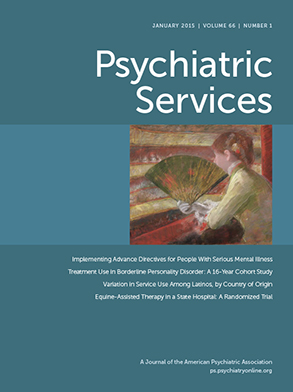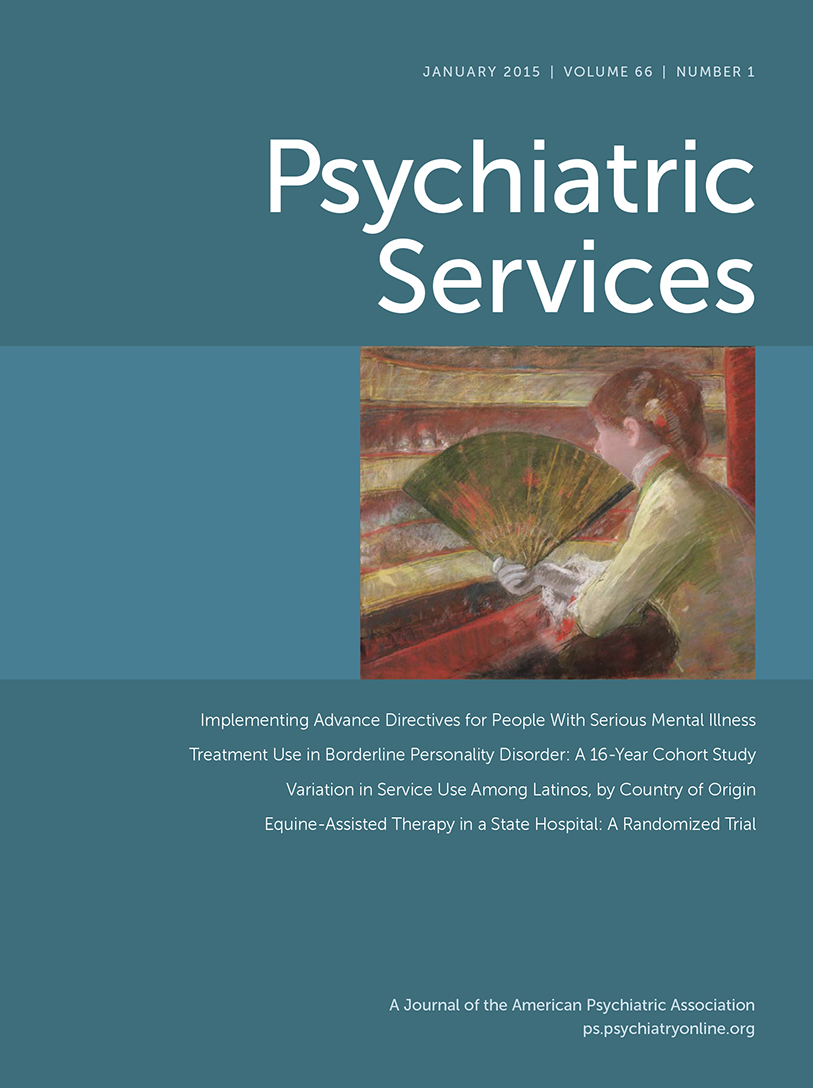Approximately two-thirds of states have legislation that authorizes the execution of advance directives for mental health care (
1). The growth of support for psychiatric advance directives complements the shift in mental health services from a coercive model to a recovery-oriented model. Recovery-oriented systems of care focus on providing high-quality, evidence-based treatment in the least restrictive setting. The most promising way to reduce coercion is to create an accessible recovery-oriented system that draws people into treatment because it provides what they need and want, thereby reducing the necessity of pushing them into services (
2).
Benefits of psychiatric advance directives include their potential to increase consumer empowerment and autonomy by providing a platform for collaborative, consumer-directed treatment planning (
3). In addition, these directives reduce the need for coercive crisis interventions, as demonstrated by a two-year study that found that consumers who had completed a psychiatric advance directive were half as likely to require coercive interventions as those who did not (
4). Avoiding the use of coercive interventions is important because of their negative impact on treatment satisfaction, which is correlated with prognosis, quality of life, functioning, incidence and length of readmission, and more (
5). Thus psychiatric advance directives are potentially powerful tools because of their effect on clinical outcomes pertinent to recovery and the legal enforceability of designating a health care agent and making specific treatment choices permitted by law.
This column describes successful efforts in Virginia to translate psychiatric advance directive legislation into actual use of these empowering tools.
The Need for an Implementation Strategy
Seeking to promote the use of psychiatric advance directives among mental health care consumers, Virginia’s multistakeholder Commission on Mental Health Law Reform (Commission) began a two-year consensus-building effort (2007–2009) among key stakeholders that aimed to include support for psychiatric advance directives in a blueprint for comprehensive mental health law reform. The stakeholders included consumers and families, health care providers and administrators, peer and advocacy agencies, and officials from all three branches of state government. This process culminated in a major overhaul of the state’s Health Care Decisions Act (HCDA) in 2009–2010 (
6). Virginia integrated mental health, general medical, and end-of-life care into one, holistic advance directive. Therefore, advance directives with instructions for mental health care are not called psychiatric advance directives in Virginia, although for convenience we refer to them as such here.
After the revisions, the Commission recognized that despite the natural fit between psychiatric advance directives and Virginia’s shift toward recovery-oriented services, implementation would require additional work. Although psychiatric advance directives are viewed by many stakeholders as promising tools for responding to crises (
7), it is generally recognized that their promise has not yet been fully realized because of low rates of execution (
8) and variable rates of access and use by clinicians (
9). With this in mind, the Commission convened the stakeholder leadership to translate these important legal innovations into service innovations by embedding the execution of psychiatric advance directives into routine mental health care.
Stakeholder Governance and Oversight
A successful implementation effort requires intensive participation by stakeholder organizations. It cannot rely on legislative action alone. Recognizing that its consensus-building approach and ongoing oversight would be necessary for implementing reform, leaders of the Commission, which was scheduled to expire in 2011, created an ongoing collaborative oversight body, a coordinating committee of stakeholder representatives that meets as needed to resolve strategic issues.
Day-to-day oversight is provided by an executive committee, which includes officials from Virginia’s Department of Behavioral Health and Developmental Services (DBHDS), the former chair of the Commission, and the leaders of research and implementation teams from the University of Virginia and Duke University. The executive committee meets biweekly to update and guide implementation and research activities. The state agency–academic partnership provides a “feedback loop” for assessing how research can inform implementation and for addressing new research and policy questions raised by implementation experiences.
The executive committee also oversees several work groups. A team of specialists in health law oversees drafting of legal forms, legal opinions, and other authoritative statements about the law that appear in FAQs, commentaries, and educational materials. This group also advises the leadership on legislative proposals. Another work group oversees the preparation of training materials and curricula for facilitators. A work group of lawyers collaborates with law schools and state and local bar organizations to establish a statewide network of lawyers able and willing to provide pro bono assistance to consumers and advocacy organizations to facilitate execution of advance directives.
Integrated Advance Directive form: a Legal Innovation
The HCDA, as revised, integrates instructions for mental health care into the basic legal framework of health care decision making that formerly covered only end-of-life care. This integrated approach was designed to express the fundamental idea that mental health is central to a person’s overall health and well-being, to reinforce the importance of integrating general medical and behavioral health care, and to reduce stigmatization associated with separate treatment. When HCDA was revised, only six other states had woven language about mental health decision making into their existing health care decision laws (
1). Virginia, however, appears to be the only state to have incorporated mental health language directly into the statutorily suggested advance directive form (
10).
After the legislative revisions, several forms were drafted by attorneys and providers, but they typically focused on end-of-life medical care. A comprehensive integrated advance directive form that covers both general medical and mental health care and is more user friendly was created by the legal advisory team, informed by the experience of attorneys who had facilitated many advance planning documents with consumers, and vetted by relevant legal groups (
11). That form is being used as the standard or “default” form in the implementation project.
Models of Facilitation: a Service Innovation
Despite the positive outcomes associated with psychiatric advance directives, the number of consumers completing these documents remains low. Surveys of mental health consumers have found that 66%−77% of consumers would complete a psychiatric advance directive if given the opportunity and assistance; however, only 4%−13% actually have completed one (
8). Examining this startling gap, Swanson and colleagues (
12) found in a randomized controlled trial that providing one-on-one facilitation by case managers significantly increased completion of psychiatric advance directives (3% for the control group versus 84% for those who met with a facilitator). Facilitation also increased satisfaction with treatment services and improved the working alliance with treatment providers (
12).
Early conceptualization of Virginia’s facilitation model focused on mental health case managers and was based on Swanson and colleagues’ facilitation study (
12). Virginia’s public mental health services system consists of the DBHDS and largely independent community service providers, called Community Services Boards (CSBs). The CSBs were targeted as the key system components for initial implementation because they serve a large proportion of individuals with serious mental illness receiving outpatient services, including those from disadvantaged groups, and provide a wide range of services, including case management and emergency services. Of the 40 CSBs in Virginia, five were initially targeted as demonstration or “vanguard” sites. A one-day training was provided to case managers from the five CSBs in June 2010. Despite the hope of replicating Swanson and colleagues’ model, however, it quickly became evident that case managers’ typical caseloads were too demanding to allow time for thorough facilitation of directives.
It also became clear that such a one-size-fits-all approach was insufficient. Implementation of any innovative practice requires a balance between standardization and adaptability (
13). The importance of standardization (or fidelity) is grounded in the empirical data supporting the efficacy of a proposed intervention. If fidelity to the model is not maintained, it is less likely that the same level of benefit will be obtained, and even if the benefit is the same, it is not clear that the same intervention is being used. Nevertheless, adaptability or flexibility is a desirable feature of an intervention because it allows implementation to be tailored to fit an organization’s needs, infrastructure, and competencies (
13). In retrospect, it was seen that the need for adaptability is especially great in a decentralized outpatient mental health system serving an entire state.
Ultimately, the vanguard CSBs have had most success by adopting multiple approaches to facilitation to respond to the individual preferences of consumers, to cope with resource constraints, and to allow greater access to facilitation (
14). Three approaches have been taken. The first approach is one-on-one education and facilitation by licensed staff. In this model, case managers or other staff provide education and facilitation services. Ideally, case managers ask consumers at least annually about their interest in a psychiatric advance directive. Sites have typically opted to designate certain staff (for example, a consumer services coordinator) to provide facilitation services, which requires a referral from another professional in the system.
The second approach is one-on-one education and facilitation by peers. In this model, peer support specialists provide education and facilitation services. Consumers are generally referred to peer facilitators by case managers or they self-refer.
The third approach is group education and facilitation. For organizations unable to provide one-on-one facilitation because of legal concerns (see below) or resource constraints, group education presents an opportunity to prime consumers’ interest in and ability to complete psychiatric advance directives. For example, the complementary nature of psychiatric advance directives and crisis planning have led to the addition of psychiatric advance directive group education during wellness planning groups.
Each of these models could be deployed in most states. In Virginia, however, a state bar opinion has declared that assistance by a nonlawyer in completing a legal form constitutes unauthorized practice of law (UPL). Aware of this ruling, the General Assembly stated in the 1991 HCDA that assistance in completing advance directives by health care providers is not UPL (
15). Our implementation strategy takes maximum advantage of the providers’ exemption by training and certifying peer facilitators who act under CSB supervision. Peer facilitation without health care provider oversight, however, is not currently permitted. State approaches to UPL vary widely, and the status of advance directive assistance has been explicitly addressed in only a handful of jurisdictions (
16).
Conclusions
We have highlighted three core components of Virginia’s efforts to translate a legal innovation into clinical practice: providing ongoing direction and oversight for implementation activities, developing a standard tool that capitalizes on the HCDA revisions while remaining user friendly, and identifying a necessary intervention component (facilitation) while allowing flexibility to sites in implementation. The first three years of efforts underscored the centrality of these components, and it is our impression that commitment to these components is beginning to translate into noticeable gains in implementation across the state. Virginia’s purposeful and strategic effort to translate psychiatric advance directive legislation into actual use of these empowering tools can serve as a model for other states that wish to undertake a similar effort.
Acknowledgments
The activities described in this column were supported by the Robert Wood Johnson Foundation Public Health Law Research Program; John D. and Catherine T. MacArthur Foundation Research Network on Mandated Community Treatment; Virginia Department of Behavioral Health and Developmental Services, in cooperation with the Center for Mental Health Services of the Substance Abuse and Mental Health Services Administration and the Bazelon Center for Mental Health; National Association of State Mental Health Program Directors; and University of Virginia Law School Foundation. The authors acknowledge the important contributions of Jeffrey Swanson, Ph.D., John Oliver, Esq., Jim Martinez, Rhonda Thissen, M.S.W., and Jessica Kostelnik, Ph.D.
The authors report no financial relationships with commercial interests.

